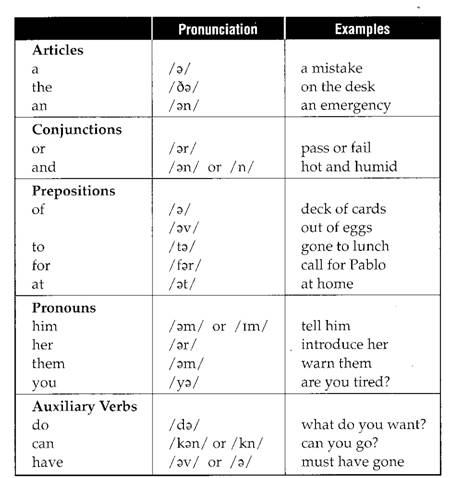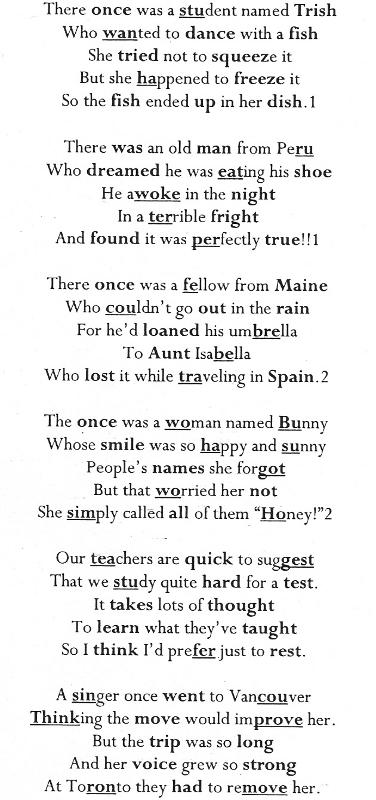Lesson 4
Rhythm: Sentence Stress
1. Sentence Stress Overview
2. Stressed Words
3. Reduced Words
4. Rhythm Groups
When we discuss rhythm, what do we mean?
We are talking about the pattern of stressed and unstressed words in sentences.
Every language has its own rhythm, or beat.
Clap the beat that this pattern makes:
Clap the beat that this pattern makes:
Which pattern represents the rhythm of your language? Which pattern represents the rhythm of English?
Now, imagine an imaginary line that exists when people speak with each other.
"I went to the park."
went park.
______________________
I to the
Native English speakers listen for the words "live" above this imaginary line. This tells the listener which words are the most important. The words "went" and "park" are stressed words and carry the most meaning in this sentence.
Pronunciation Note:
Speakers of American English sometimes give full stress to every word when they are angry or adamant.
Example: I WANT TO GO TO THE PARK.
If you have a tendency to stress every word and syllable equally, you might sound abrupt, angry or impatient without meaning to.
Just as words have stressed and unstressed syllables, so do phrases.
Listen to the speaker say these word/phrase pairs. In each pair, the rhythm of the word is repeated in the phrase.
|
Word |
Phrase |
|
overthrow |
In a row |
|
volunteer |
She was here |
|
permit |
Learn it. |
|
presented |
She sent it. |
|
herself |
An elf. |
Each box has three phrases. Each phrase has a different number of syllables but takes the same amount of time to say. Listen to the speaker say these phrases.
|
CLEAR VIEW= 2 syllables CLEAR reVIEW= 3 syllables CLEARly reVIEW= 4 syllables |
|
QUICK SLEEP= 2 syllables QUICKly SLEEP= 3 syllables QUICKly aSLEEP= 4 syllables |
|
SLOW TURN= 2 syllables SLOWer TURN= 3 syllables SLOWer reTURN= 4 syllables |
English is a stressed-timed language. The number of syllables doesn't determine how long it takes to say a sentence. The number of stressed syllables determines how long it takes to say a sentence.
Sentence Stress 1
Here are some examples with sentences with stress marked. Look at the stress marks and listen to each sentence.
1. He works in a factory.
2. The doctor called a patient.
3. She remembered to bring a calculator.
4. The schedule changes in spring.
5. They left their tickets at home.
Which words are stressed in these sentences?
a. Nouns and verbs are stressed? unstressed?
b. Prepositions, articles, and pronouns are stressed? unstressed?
Sentence Stress 2
Here are some more example sentences with stressed marked.
1. That patient has a bad headache.
2. This restaurant is very expensive.
3. His new car was small, fast, and expensive.
4. The manager is holding a brief meeting.
Which words are stressed in these sentences?
a. Adjectives are stressed? unstressed?
b. This, that, these, and those are stressed? unstressed?
c. To be, to have, and helping verbs are stressed? unstressed?
Sentence Stress 3
Here are some sentences with stressed marked.
1. I'm not talking and joking loudly.
2. They don't often call after midnight.
3. Where does he live and what does he do?
4. Who will call and make a reservation?
5. Why did they come late but leave early?
Which words are stressed in these sentences?
a. Adverbs are stressed? unstressed?
b. Negative words are stressed? unstressed?
c. Wh- question words are stressed? unstressed?
d. Conjunctions (and, but, if) are stressed? unstressed?
Stress important content words like these:
Nouns Verbs Adjectives Adverbs
doctor call small loudly
reservation come fast often
Negatives Wh- Question Words Demonstratives
don't Why this
can't Who that
Reduce or weaken function words. Function words serve a grammatical purpose, but they don't carry as much meaning.
Function Words:
|
Articles |
Conjunctions |
Prepositions |
Pronouns |
Auxiliary Verbs |
|
a/an |
and |
to |
her |
can |
|
the |
or |
of |
you |
have |
The vowel sound in weakened or reduced syllables sounds like the schwa /ə/ ('uh').
Here are some common one-syllable function words and their unstressed pronunciations.
These reductions are not errors! If you weaken these words, your speech will sound much more natural.

**Well Said by Linda Grant; 2001 Heinle and Heinle Publishers
Practice listening to reduced function words. What are the reduced words that you hear. One of the missing words in each sentence is a reduced pronoun/auxiliary verb with a disappearing h (him=/im/)
1. _________ running for president?
2. ________ report be ready by tomorrow?
3. She's never used _______ credit cards.
4. He picked up _____ children.
5. __________ gotten lost?
6. __________ had two heart attacks.
7. That's what ________ said.
Record in Reduce Function Words Voice Board.
Children's Poetry is an excellent way to practice rhythm.
How many strong beats do you hear in each line? Scroll your mouse over the line to see the correct answer.
Three blind mice! ___
See how they run! ___
They all ran after the farmer's wife ___
She cut off their tails with a carving knife ___
Did you ever see such a sight in your life ___
As three blind mice? ___
One, two, ___
Buckle my shoe; ___
Three, four, ___
Knock at the door; ___
Five, six, ___
Pick up sticks; ___
Seven, eight, ___
Lay them straight. ___
(Note that it doesn't matter how many syllables there are, it still takes the same amount of time to say a phrase with two stressed syllables,)
Practice saying these limericks with me. Remember, in order to keep the rhythm, you must reduce (say quick, quiet, and low) the unstressed syllables.

The word can't is stressed. It has a long clear /æ/ vowel sound.
Example: I Cæn't GO.
The word can is unstressed. It has an obscure /ə/ vowel or no vowel sound.
Examples: I cən GO. (or) I cn GO.
To understand the difference between can and can't , English speakers rely on the stressed/unstressed vowel sound NOT the presence/absence of the /t/ sound.
Listen to the sentences below. Do you hear can or can't?
1. I ______ call you tomorrow.
2. I _____ understand the question.
3. She _____ meet with me today.
4. He _____ make an appointment tomorrow.
5. He _____ come to the party.
6. I _______ be there by ten.
Click here to download the worksheet "Practicing Stressed Words and Reductions." Record these sentences in the Voice Assignments Board in Lesson 4.
In sentences you hear stressed syllables and words together with unstressed syllables. The alternating pattern of stressed and unstressed syllables is called rhythm.
Listen to and repeat the sentences. Tap your pencil on the desk for each stressed syllable or word.
It's time to leave for the show.
We need some bread from the store.
Be sure to call when you get there.
The car is in need of repair.
Now listen for the unstressed syllables. The vowels in unstressed syllables sound like /ə/ or /I/.
They had lots of time but little money.
A storm will come later today.
He will go out to eat tomorrow.
In longer sentences, speakers say words in rhythm groups. There are very short pauses between rhythm groups.
Listen to these sentences marked in rhythm groups.
The store will be open / from nine to ten.
The rent is due / at the end of the month.
I need some more time / to finish the exercise.
His lecture on oceans / was easy to understand.
How many stressed syllables are in each rhythm group? ______
How many unstressed syllables do you find in each rhythm group? _____
Now listen again and repeat the sentences. Say the words in rhythm groups. Pronounce the stressed syllables high, long and loud. Pronounce the unstressed syllables low, short, and quiet.
Here are some long sentences. Listen and practice reading them in rhythm.
1. You'll find a grocery store / a block down the street.
2. The date of the test / will be announced in class.
3. We were best friends / during middle school and high school.
4. When I came in the room / Jen was on the phone/ talking to her mother.
5. I'm reading a book / about the effects of the war / on soldiers who have returned home.
6. Please leave your name and number / and I'll call you back / as soon as I'm able.
Download the following worksheet on Rhythm Groups. Click below to hear some long sentences. Put a line (/) between the rhythm groups that you hear. After you mark the rhythm groups. submit the worksheet in CE6 assignments AND record the sentences in the Rhythm Groups voice board.